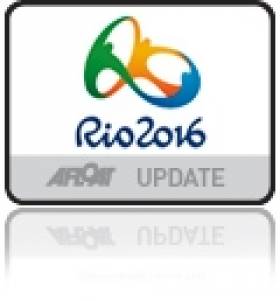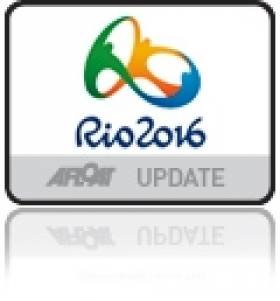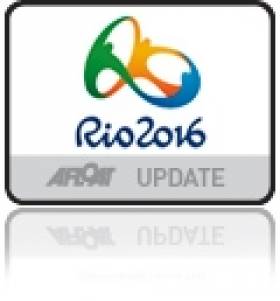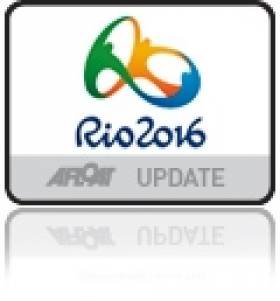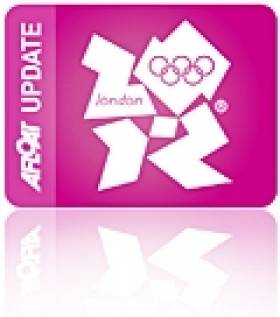Displaying items by tag: Matt McGovern
#swchyeres – In a significant boost to their campaign for Rio 2016, Irish Olympic skiff sailors Ryan Seaton and Matt McGovern from Belfast Lough are medal contenders at the final day of the ISAF World Cup regatta in France tomorrow. The 49er duo finished five days of fleet racing this afternoon in third place overall. Of 80 teams competing, only the top 10 will now sail a further three races on Saturday – each worth double points – to determine the medals. Although 23 points separate the NI pair from Kiwi leaders Peter Burling and Blair Tuke the gold is still within reach.
Laser radial sailor Annalise Murphy will also be competing in a medal race tomorrow. The Laser Radial class will only have one double points race before the gold, silver and bronze are awarded. Murphy is currently lying in eighth place but separated from the top three by 36 points.
Three other Irish teams also competing at the event finished racing today. In the Paralympic Sonar class John Twomey, Ian Costelloe and Austin O'Carroll finished in seventh place overall. Andrea Brewster and Saskia Tidey finished 16th out of 42. James Espey was sailing in the men's Laser Standard fleet of 123 and finished 71st.
Irish 49er Pair Finish 14th in World Champs, 49erfx Girls Take Race Win
#49er – Irish 49er skiff duo Ryan Seaton & Matt McGovern from Belfast have finished outside their target of top 10 in their first world championships on the road to Rio 2016 but have nevertheless posted a credible 14th overall in a 90–boat fleet. And in the women's 49erfx class Ireland's Andrea Brewster and Saskia Tidey who have only been sailing together for two months had a good regatta for their first event finishing 36th. The highlight of the event for the new team was a race win in the silver fleet on the penultimate day in the 53–boat fleet.
In both the men's 49er and women's 49erFX the day started with a petit final which was made up of the sailors who were in 10th – 20th position in the Gold Fleet and the winner competed in the three final races with the top 10 afterwards.
Seaton and McGovern finished in 16th in the petit final which left them in 14th position overall in the regatta.
It was a good event for Team NZL who won the event with Burking & Tuke and their teammates Hansen & Porebski finished in 2nd place. Australia's Nathan Outteridge and Iain Jensen, London 2012 Gold medalists finished in 5th place.
#olympicsailing – Irish Olympic duo Ryan Seaton and Matt McGovern finished 26th overall yesterday at the 49er European championships in Denmark.
Thusgaard Olsen are Denmark's latest sailing sensations after they became the SAP 49er FX European champions on Sunday on the bay where they learned to sail as seven year olds, 13–years ago. Results here.
Both women's Irish 29er pairings Tiffany Brien and Saskia Tidey and Claudine Murphy and Andrea Brewster found the going tough in Aarhaus, finishing at the back of the silver fleet. Results here.
It was a momentous day for the 49ers and Olympic sailing generally too with a fantastic example of the 'theatre style' racing close to the shore. Aarhus's weather gods delivered on cue with a sea breeze allowing the short course, 500 metres long by 200 metres wide, to be laid perpendicular to the long promenade where the crowd basked in glorious sunshine. For the spectators and for television it made what can seem a remote sport exciting and understandable. Sport Event Denmark, Sailing Aarhus and Sport Aarhus Events have yet to confirm whether are bidding for the 2018 ISAF world championships, but if they do, this will provide a powerful case study.
There was a dramatic backdrop too as the Aarhus has been simultaneously hosting the start of The Tall Ships Race. The compact city has happily handled the hundreds of thousands of people flooding into the harbour over the weekend.
The men's races went down to the wire. But after their capsize, New Zealand's Peter Burling and Blair Tuke, the Olympic silver medalists, showed champion calm and skill. They won the next race and with the points level with Britain's Dylan Fletcher and Alain Sign going into the last race, they got a good start and were able to get ahead of the British and manage them for the whole race. The French pair of Julien d'Ortoli and Noe Delpech took bronze. It was the second New Zealand medal of the day after Alexandra Maloney and Molly Meech won a hard-fought bronze in the women's FX.
Results:
SAP men's 49er European Championships
1. Peter Burling and Blair Tuke, 89 points
2. Dylan Fletcher and Alain Sign, 93
3. Julien d'Ortoli and Noe Delpech, 112
SAP women's 49er FX European Championships
1. Ida Marie Baad Nielsen and Marie Thusgaard Olsen, 87
2. Martine Soffiatti Grael and Kattena Larsen Kunze, 104
3. Alexandra Maloney and Molly Meech, 108
Ryan Seaton and Matt McGovern have kick-started their Rio 2016 campaign in the most convincing fashion with a Gold medal at the Sail for Gold Regatta in Weymouth this afternoon.
The breakthrough performance is the first international medal for the Belfast lough duo who beat numerous World and European medallists in the process.
This is London 2012 pairing's first major event since competing at the venue a year ago, when Weymouth played host to the Olympic regatta.
Going into today's medal races, the pairing had a six point lead but could have been overtaken by any of the top 10 as three double point races were scheduled. In the end, they sealed victory in style extending their lead as Afloat.ie reported earlier posting a third and a second respectively in the two medal races.
Ryan Seaton and Matt McGovern
Now ranked 17th in the world Belfast pair Ryan Seaton (23) and Matthew McGovern (25) shot to prominence at the ISAF World Championships in Perth last December sailing to a level some never expected in this high speed dinghy class.
For the latest news campaign news click here
Sailing together since 2009 Carrickgfergus based Seaton, a former top Laser youth helm, teamed up with Bangor man McGovern with the aim of 2012 selection but got off to a slow start in the worlds in the Bahamas finishing in the 40s.
Their steady rise into the higher echelons of the international class culminated with an eighth in the Perth medal race last December to give them a 10th overall at the ISAF World championships, a personal best result for the Ballyholme Sailing Club pair and a London Olympic ticket to boot.
They are Ireland's first Olympic representatives in the 49er class since Tom Fitzpatrick and Fraser Browne finished 16th at the Athens games in 2004.
No Medal Race for Irish 49er Campaign
#49er – Ireland's 49er Belfast skiff campaign has ended without the much hoped for medal race participation.
Today's last day of fleet racing was Ryan Seaton and Matt McGovern's last opportunity to hold on to a top ten position before next Wednesday's medal race.
The pair were tenth overall heading in to Race 14 but only four points separated them from 13th place. Seaton and McGovern finished in 16th which saw them drop to 11th overall. Sadly Race 15 had an equally frustrating ending, seeing the pairing finish in 16th and 14th overall ultimately ending their dreams of racing in the medal race.



























